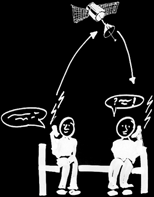| Workshop Results: Info-Eco Work
The Challenge
A sustainable world economy will be one that finds useful 'work' for 8 billion people. Can we come up with alternatives that give new meaning to 'having a job'? Having a project? Having a network? Having a life?
Zombies
At first glance, there are many positive implications of telework: it creates a seamless fusion between work and leisure, it enables quiet and concentrated work, it makes offices superfluous, it allows for flexible working hours. It is not that simple, however. The group focused on two aspects of work to provide a better understanding of the issues involved.
* What is work?
* How do we need to communicate in order to perform work?
Work is more than employment. It is creating value. Value can be ecological value (contributing to sustainability), social value, psychological value, financial value (gaining assets), etc. Value is also created during what is perceived as 'non-work'. Thus, both work and non-work have to be considered if we think about the creation of value.
In order to create value, people communicate -- not only 'in the flesh', but also via information andcommunication technologies.
The successful application of information and communication technologies is ultimately dependent on a deep knowledge of the qualities of real-life, face-to-face, body-to-body communication. We first need to understand during which parts of work-related communication physical contact is absolutely imperative... So the first question is not: When can we meet electronically? but rather: When do we have to be together? Once we have found this out, we can join efforts with urban planners and create physical communities where proximity follows from necessity. Thus, we can minimise the need for transportation and optimise virtual communication by providing rich communicative capacity where it complements 'real' contact in a meaningful way. Then we can welcome telework as a valuable addition that supports rather than obstructs the creation of value.
The alternative is a techno-gloom scenario: People will live in local claustrophobic communities. Their houses will become a telework prisons. They will not know how to make physical contact anymore. They will become zombies...
Participants
Darin Beaman, Senior Designer, Art Center College of Design, USA Eric Britton, Director, EcoPlan International, Paris, France Debra Cash, New Century Enterprises, Harvard Graduate School for Design, Boston, USA (moderator) Carolien Herlaar, Policy Official, Ministry of Housing, Spatial Planning and the Environment, Directorate-General for Environmental Management, The Netherlands Kaarle Kukkavaara, Student, University of Art & Design Helsinki, Finland Miriam Luijken, Industrial Designer/Researcher, KPN Research, The Netherlands Ulf Mannervik, Department of Architecture's Theory and History, Chalmers University of Technology, Sweden Jonathan Mees, Communication Coordinator, Canon Europa, The Netherlands Samu Mielonen, Student, University of Art & Design Helsinki, Finland Catherine Murphy, Education and Training Manager, Centre for Design at Royal Melbourne Institute of Technology, Australia Paulien Strijland, Manager. Human Interfaction, Apple Computer Inc., USA Marjolein de Vink, Student Interaction Design, Utrecht School of the Arts, The Netherlands
BEYOND BEING THERE |
|
url: DOORS OF PERCEPTION editor@doorsofperception.com |


